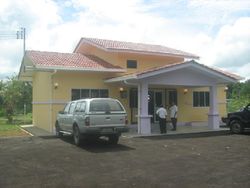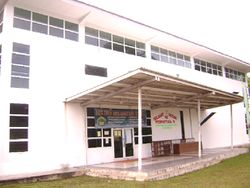Public Libraries in Sarawak
In Sarawak, the public library services are provided by government agencies such as the twenty four local authorities under the purview of the Ministry of Local Government and Housing (MLGH); the Commission of the City of Kuching North or Dewan Bandaraya Kuching Utara (DBKU), the Council of the City of Kuching South or Majliks Bandaraya Kuching Selatan (MBKS), the Bintulu Development Authority (BDA) and the MLGH itself.
Contents
Brief History
During the White Rajah era right up to the British rule under the Crown Colony of Sarawak, the library services were in the form subscribed services catering for the needs of the government officers and expectorates. There was also book box services, where books were packed in boxes and sent to sub-urban and rural areas for the officers serving there. In the 1950s and 1960s, the British Council played a major roles in providing library services in Kuching.
In 1970, the then Ministry of Local Government of Sarawak established the Library Division to coordinate the library development in Sarawak. By this time the local authorities in Sarawak were mandated to provide public library services in their ares of administration. Being the central agency in administrating the library development in Sarawak, the Library Division assumed the roles and functions of a state library. Rightly so, it was later called the Sarawak State Library.
With the passing of the Sarawak State Library Ordinance in 1999, the Library Division ceased the roles of the Sarawak State Library and Pustaka Negeri Sarawak officially becomes the State Library.
The Local Authorities
Public libraries are generally managed by the local authorities, which may be a city, municipal or district councils. These local authorities operate under several Ordinances. The Local Authorities Ordinance, 1996 makes it compulsory for the twenty four local authorities under the MLGH and the MBKS to provide library services in their areas of jurisdiction.
The DBKU operates a city library and eleven community libraries under the Commission of the City of Kuching North Ordinance, 1988, while the BDA operates a main library and three branch libraries under the Bintulu Development Authority Ordinance, 1978. In most cases there is a main or central library, sometimes with district libraries or branches around an urban area, and often with an extensive number of village libraries.
The roles of the Federal Government of Malaysia
At the Federal Government of Malaysia’s level, funding for a number of public library programmes has been made available to the Sarawak State Government for many years through the National Library of Malaysia (NLM). One of the NLM's roles is to ensure that a nationwide system of libraries which meet national standards is available to the public. In 2005 the Federal via NLM set up five Special Project (SP) village libraries in Sarawak. In 2007, eleven more were constructed and in 2012, one was successfully set up under the same programme. Under another initiative and as part of the Eighth Malaysia Plan, eleven village libraries with advanced information and communications technology (ICT) facilities were established under the Perpustakaan Desa Siber Ilmu (PDSI) programme.
In a separate initiative extending through a number of phases, over a hundred village libraries benefited from enhanced ICT facilities under the Universal Service Provision (USP) programme financed by the Ministry of Energy, Water and Communications of Malaysia and the Malaysian Communications and Multimedia Commission (MCMC).
Federal funding has also made possible the commissioning of a number of mobile libraries, serving outlying areas with too small or scattered a population to justify a permanent library building. Day to day management of the standard mobile libraries and mobile multimedia libraries is in the hands of the MLGH and Pustaka Negeri Sarawak respectively, with the cooperation of local authorities.
What Public Libraries Do
Although the dominant purpose of public libraries is to provide lending and information services for their local communities, their role is broadening to embrace a social as well as educational function. Libraries are becoming the hubs of their communities. They are places where people are free to come and go, to interact with their fellow citizens, or to join in group discussions or events. Public libraries are for people of all ages, of all backgrounds and of all degrees of academic attainment. There really is something for everyone at the library.
Collections of books, sets of magazines and newspapers, important government reports and other printed materials are the bread and butter of library operations. ‘Circulation’ – the library jargon for loans of books and other items – is still a very important part of any public library operation.
Behind the scenes, skilled library staff are selecting items for particular libraries from the mass of material churned out by the world’s printing presses, and organising them so that users can find them. Library staff are making sure that as far as possible they are stocking their shelves with the resources from which their users will gain most benefit. They are selecting items in the key languages of education, business, commerce and day to day communication. They may be making some resources highly ‘visible’ through online catalogues. They are trying to add to their collections items which reflect a diversity of opinions, the state of knowledge of a particular subject at the time or the heritage and character of a place or an age. In the workplace, from a modest village library to a state of the art information centre, the library staff use their skills to bring their customers and their library resources together, to help them find the right book, journal article or electronic resource for their needs, or the right piece of information, or the right approach to take to research a topic.
Increasingly information is ‘packaged’, not in print form, but in an electronic medium – a disk to place in a local machine or a remote data bank to be accessed through a computer. The same helpful guidance is available from library staff, irrespective of formats. Often the full text of an item held elsewhere can be rapidly obtained.
On other occasions, items can be borrowed by one library from another – the inter-library loan network at work. No single library can operate in isolation and hope to collect everything which its users might need, so resource sharing is necessary, facilitated by electronic links between libraries.
Of course print-based activities are still very important, and storytelling and other activities based on reading such as book clubs, are very popular. As international research has shown, up to date and relevant collections are as important as attractive library buildings and well-trained library staff in promoting the use of libraries by the community.
Categories of Public Libraries
| Town and District Libraries | Village Libraries under the Local Authorities | Village Libraries under the National Library of Malaysia | Mobile Libraries | Total | ||||
| 49 |
176 |
38 |
7 |
270 |
Town and District Public Libraries by Zones
| Southern Zone | Central Zone | Northern Zone | ||
| _______________________________ | _______________________________ | _______________________________ | ||
|
01) DBKU City Library |
01) Sarikei Public Library |
01) BDA Public Library |
The Mobile Libraries
|
01) Kuching Mobile Library |
05) Sibu Mobile Library |



